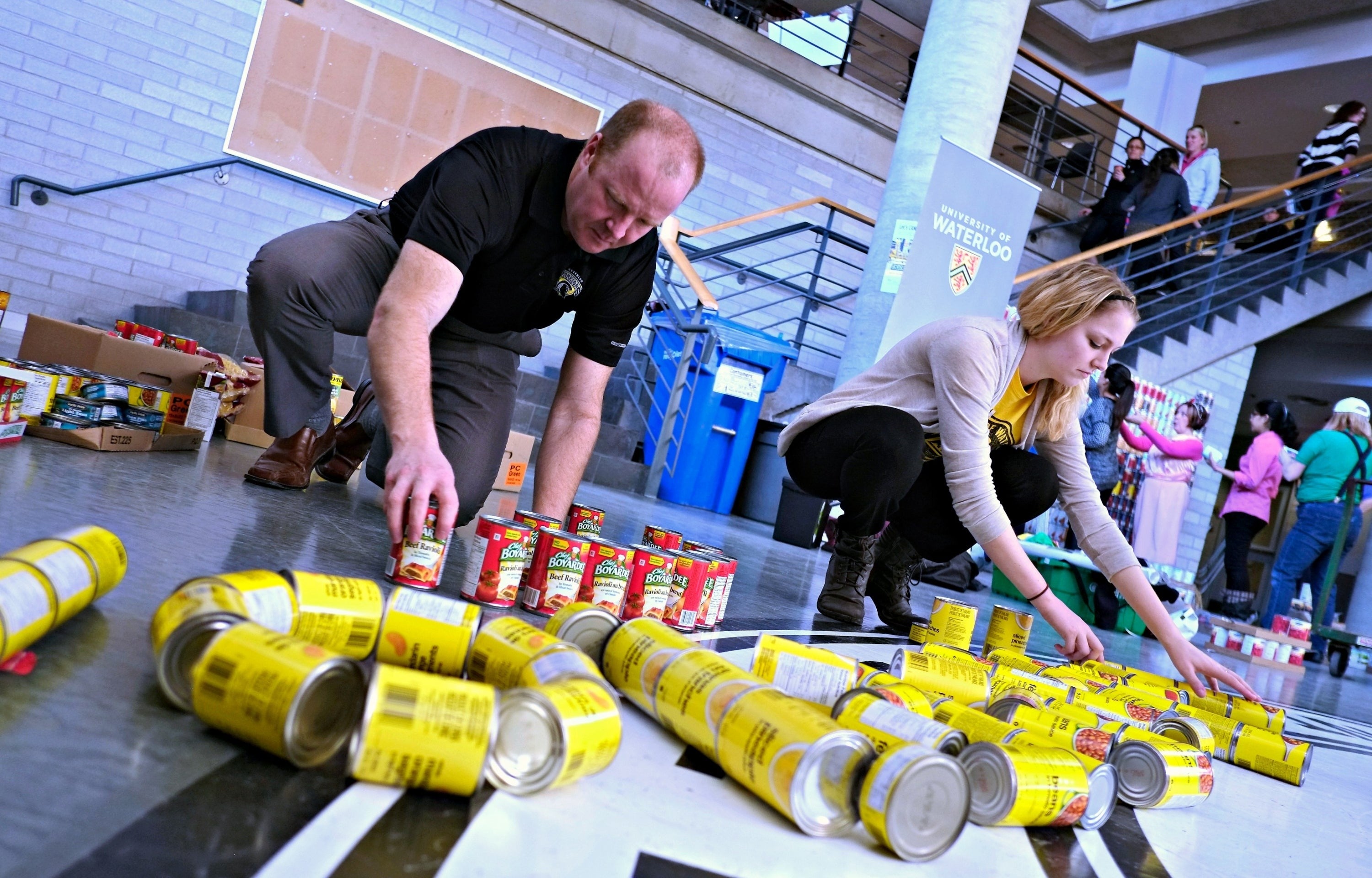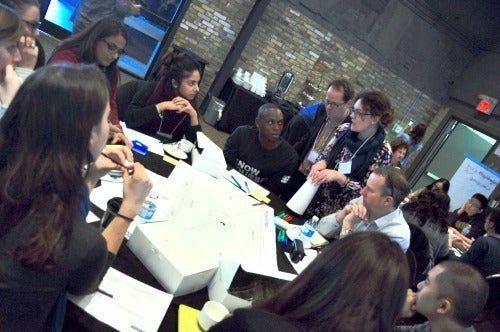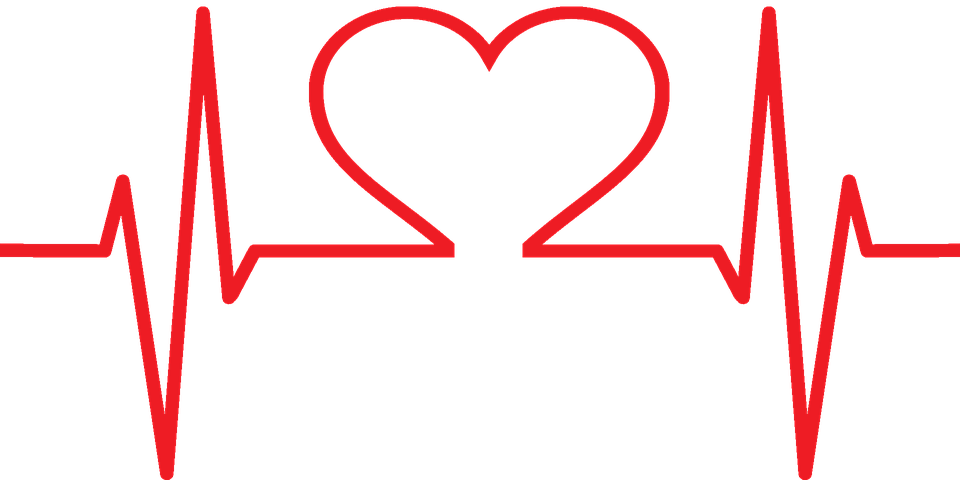Editor:
Brandon Sweet
University Communications
bulletin@uwaterloo.ca
Canning hunger to create social change

This is the latest in a series of #UWCommunity stories that feature Waterloo in the community.
Homelessness and food insecurity affect countless communities and groups of people, including many in the Waterloo Region. Locally, more than 3000 people used the shelter system in 2015 and 1 in 20 households rely on food banks.
Leading to issues surrounding mental health and well-being, individuals and families plagued with these concerns face hardships that lead to a poor quality of life. The University of Waterloo and fellow community partner organizations recognize these as significant problems that need addressing. On February 1, 2016, the first ever regional Design Jam was hosted by St. Paul’s GreenHouse and Communitech’s Accelerating Social Cause Entrepreneurs (ASCEnt), as an innovative way to engage students and youth aged 18 to 29 in a curated open discussion about improving food and housing security in Waterloo Region.

With workshops facilitated by the Ontario College of Art and Design’s sLab (Strategic Innovation Lab), young leaders, mentors, and aspiring entrepreneurs gathered to conceive creative user experiences and activate ideas to address these complex problems. Director of St. Paul’s GreenHouse, Tania Del Matto, believes it’s integral to expose youth to large-scale human issues, not only to generate awareness, but more importantly, to engage them in the problem solving process and unite them with their community:
"Often youth are eager to get involved in social causes, but are slightly removed from the issue. We wanted to change that with this event by inviting community members who had lived experience with accessing emergency food, shelter and related support services to participate in the Design Jam by sharing their stories and providing feedback on the ideas generated."
Participants received training on different human design centred tools to come up with new ideas based on the problems and pain points expressed by community leaders such as Wendy Campbell, Executive Director of The Food Bank of Waterloo Region. By purposefully collaborating with our community to improve the quality of life for those accessing emergency food and shelter, youth were empowered to discover and refine their best ideas to help create social impact.
Events such as Design Jam encourage students to think about how to end homelessness and food insecurity, much like the University of Waterloo’s upcoming CanBuild food drive, which strives to create awareness about hunger by providing food resources to those in need. Heading into its third year, CanBuild is not your typical food drive: it challenges teams of Waterloo students, staff, and faculty to be creative by designing and building structures out of collected food donations. Through a partnership with the Federation of Students, the University organizes this annual campus-wide initiative in support of the Feds Student Food Bank and The Food Bank of Waterloo Region.
Do you want to make a difference? Join us in our effort to CAN hunger and create social change in our community. Register your team for CanBuild today!
Board approves tuition, incidental fees
At its first meeting of the year on February 2, the University's Board of Governors voted to approve the Recommended Tuition Fees for 2016/2017.
In the broadest of terms, the tuition increase categories are as follows:
Undergraduate students (domestic):
- Regulated programs (year 1) - 3 per cent
- Regulated programs (upper years) - 3 per cent
- Deregulated programs (year 1) - 5 per cent (with exceptions)
- Deregulated programs (upper year) - 4 per cent to 5 per cent
- Deregulated AFM, Biotech/CA. CFM, Math/CA (all years) – 1 per cent
- Accountancy Diploma - all years - 2 per cent
- Global Business & Digital Arts - all years - 3 per cent
- Pharmacy - all years - 1 per cent
Graduate Students (domestic):
- Specifically identified master and diploma programs - 1 per cent to 5 per cent
- Research Master and PhD programs - 1 per cent
International Students:
- Undergraduate programs - 9 per cent
- Deregulated AFM, Biotech/CPA, CFM, Math/CPA (all years) – 1.5 per cent
- Graduate programs except research programs - 9 per cent
- Graduate research programs (Master and PhD) - 3 per cent
- Specifically identified Master and Diploma programs - 3 per cent to 15 per cent
The Registrar’s Office and the Graduate Studies Office informed international students of the fee increases by memo on February 9.
Variability in tuition increases from program to program is driven by a number of factors, including the relative competitiveness of Waterloo's current tuition rates with its Canadian peers, the overall 3 per cent MTCU cap for domestic students, a 3 per cent cap for regulated programs and a 5 per cent limit for deregulated programs, and an increase for international undergraduate and master's programs that includes an offset for the MTCU-imposed $750-per-student International Student Recovery and the $75-per-student grant-in-lieu of taxes reduction.
This is the third year of the MTCU’s tuition framework, which went into effect for the 2013/2014 year.
In addition, governors voted on the 2016-2017 residence fees, effective in the Fall 2016 term.
Fees in the Student Villages, UW Place, Columbia Lake Village and the Minota Hagey residences will increase by 3.5 per cent, and the family residences in Columbia Lake Village will see an increase of 2 per cent.
Governors also voted to approve a selection of incidental fee changes, including a 2 per cent increase to the Engineering Society fee, a 1.2 per cent increase to the Imprint fee, which is compulsory for all undergraduate students, and a 2.7 per cent increase in the undergraduate and graduate Co-op Fees. These incidental fees go into effect in the Spring 2016 term.
Understand your heart health
This article was written by Excellence Canada and is published on behalf of the Healthy Workplace Committee.

The heart is one of the most important organs you have because it’s in charge of pumping blood with oxygen and nutrients throughout your body. There are several conditions that could affect the structure and functions of the heart, and cause a heart disease. For example, when fat and other materials build up in the arteries, they form a plaque that prevents the blood from flowing properly to the heart. At first, that plaque only reduces the space the blood has in the arteries to travel, but if nothing is done, that plaque keeps building up until no blood can flow through that artery, and you could develop a heart attack or a stroke.
There are several things in your workplace that could be affecting your heart health. For example, sitting for long periods makes the blood flow more slowly and your muscles burn less fat than usual; this combination of events makes it easier for the fat to build up in your arteries. Another important factor in your workplace is what you eat and do on your break(s). A lot of people usually eat fast food for lunch because it is fast and cheap, but this type of food tends to be higher in saturated fats and very caloric, which then causes heart problems. Another common thing people do during breaks is smoking, but not only is that affecting your lungs (and many other organs), it also causes heart diseases, because the smoke reduces the oxygen in your blood, and the chemicals in the cigarettes damage blood cells, which then contributes to plaque build-up and prevents the heart from working properly.
Just by making some lifestyle changes you could add up to 5 years more to your life by preventing heart diseases:
- Stop smoking
- Avoid alcohol consumption
- Eat more vegetables and reduce your consumption of animal and processed foods (bring lunch to work)
- Take your blood pressure regularly and control it (less than 120 mm Hg systolic and less than 80 mm Hg diastolic)
- Be active every day and avoid sitting too much (stand up every hour!)
- Control chronic diseases (if you already have one or more)
The Healthy Workplace Committee would like to thank Excellence Canada for providing the above article on Heart Health.
Link of the day
30 years ago: Mir space station launched
When and where
Reading Week, Monday, February 15 to Friday, February 19.
Hagey Bonspiel, Saturday, February 20, 9:00 a.m., Ayr Curling Club.
Senate Meeting, Monday, February 22, 3:30 p.m.
Pursue a part-time or on-line degree at Waterloo, Undergraduate programs, Tuesday, February 23, 12:00 p.m., TC1208.
WICI presents Professor César Hidalgo, “Why Information Grows,” Tuesday, February 23, 2:00 p.m., DC 1302.
Waterloo International presents a DAAD Faculty Information Session featuring Dr. Alexandra Gerstner, director, German Academic Exchange Service (DAAD) Information Centre, Toronto Tuesday, February 23, 2:00 p.m., Quantum Nano Centre.
Author event featuring Marc Degens, "God's Busted Knee," Tuesday, February 23, 4:00 p.m., EV3 3406.
Noon Hour Concert: Timepoints: The Toronto Percussion Ensemble, Wednesday, February 24, 12:30 p.m., Conrad Grebel University College.
New Faculty Information Social Series: Copyright and Licensing, Wednesday, February 24, 2:30 p.m. to 4:00 p.m., EV1 241.
Public Lecture featuring Professor Melanie Campbell, "The Eye, Window to the Brain," Wednesday, February 24, 7:00 p.m., THEMUSEUM.
Velocity Start presents Do People Want Your Sh*t?, Wednesday, February 24, 7:30 p.m., Velocity Start, SCH 2nd Floor.
UWSA Special General Meeting, Thursday, February 25, 9:00 a.m., DC 1302. Coffee and treats available at 8:45 a.m.
Declutter Your Life: The Physical & Visible, Thursday, February 25, 12:00 p.m., MC 5501.
WaterTalks Lecture featuring Dr. Susan Hubbard, Lawrence Berkeley National Labs, “Geophysical approaches for quantifying watershed structure and function”, Thursday, February 25, 2:30 p.m., DC 1302.
Waterloo Institute for Sustainable Energy presents Power Shift: Rethinking Design for Energy Access, Thursday, February 25, 3:00 p.m. to 6:00 p.m.
Knowledge Integration seminar: “Trans-science and the Limits of Disciplinarity”, featuring Dr. Ashley Rose Kelly, Department of English Language and Literature, Friday, February 26, 2:30 p.m., AL 113.
Bridges Lecture Series - The Harmonograph, Friday, February 26, 7:30 p.m., Siegfried Hall, St. Jerome's University.
2016 Student Global Health Forum - Innovative Approaches to Global Health Challenges, Saturday, February 27, 8:00 a.m., Environment 3.
Master of Taxation Open House, Saturday, February 27, 10:00 a.m., Downtown Toronto.
Gender and Equity Scholarship Series, “Gendered or neutral? Considering the language of human-computer interaction,” Tuesday, March 1, 11:30 a.m., MC 5501.
Renison presents a guest lecture featuring Director-General Rong Chuan Wu, Taipei Economic and Cultural Office, Toronto, “Taiwan’s Foreign Policy,” Tuesday, March 1, 2:30 p.m., REN 2106.
WatRISQ Seminar featuring Motoh Tsujimura, Associate Professor of Operations Research, Faculty of Commerce, Doshisha University, Japan, “Assessing Capital Investment Strategy under Ambiguity,” Tuesday, March 1, 4:00 p.m., DC 1304.
Sawatsky Lecture featuring Sir James MacMillan, “The Spiritual in Music,” Tuesday, March 1, 7:30 p.m., Conrad Grebel chapel.
Noon Hour Concert: Afternoon’s Night Music, Wednesday, March 2, 12:30 p.m., Conrad Grebel chapel.
Pursue a part-time or on-line degree at Waterloo, Graduate programs, Wednesday, March 2, 12:00 p.m., TC1208.
Velocity Start presents How To Find Your Customers Online, Wednesday, March 2, 7:30 p.m., Velocity Start, SCH 2nd Floor.
Pascal Lectures on Christianity and the University featuring Professor James Tour, Rice University, "The Nanotechnologist & God," Wednesday March 2, 7:30 p.m., STC 1012.
Pascal Lectures on Christianity and the University featuring Professor James Tour, Rice University, "The Origin of Life: An Inside Story," Thursday, March 3, 7:30 p.m., STC 1012.
WIMIn Ideathon, Saturday, March 5 and Sunday, March 6, Hagey Hall.
Conrad Grebel presents The Music of James MacMillan, Sunday, March 6, 3:00 p.m., St. Peter's Lutheran Church, Kitchener.
Velocity Start presents Science Brainstorming, Tuesday, March 8, 7:30 p.m., Velocity Start, SCH 2nd Floor.
Noon Hour Concert: Stealth in Concert, Wednesday, March 9, 12:30 p.m., Conrad Grebel chapel.
Velocity Start presents Pitch Like A Pro, Wednesday, March 9, 7:30 p.m., Velocity Start, SCH 2nd Floor.
James E. Curtis Memorial Lecture featuring Chief Wilton Littlechild, Thursday, March 10, 5:00 p.m., Theatre of the Arts.
East Asian Studies presents a guest lecture featuring Philip Seaton, Hokkaido University, “Pop Culture, History and “Contents Tourism” in Japan,” Thursday, March 10, 6:30 p.m., REN 2106.
Bridges Lecture - Mathematics, Music, and Visual Art, Friday, March 11, 7:30 p.m., Siegfried Hall, St. Jerome's University.
Student portal hackathon, Saturday, March 12, 10:00 a.m., STC 0060.
CV tips, Tuesday, March 15, 12:00 p.m., TC 1112.
Noon Hour Concert: Haydn String Quartet, Friday, March 18, 12:30 p.m., Conrad Grebel chapel.